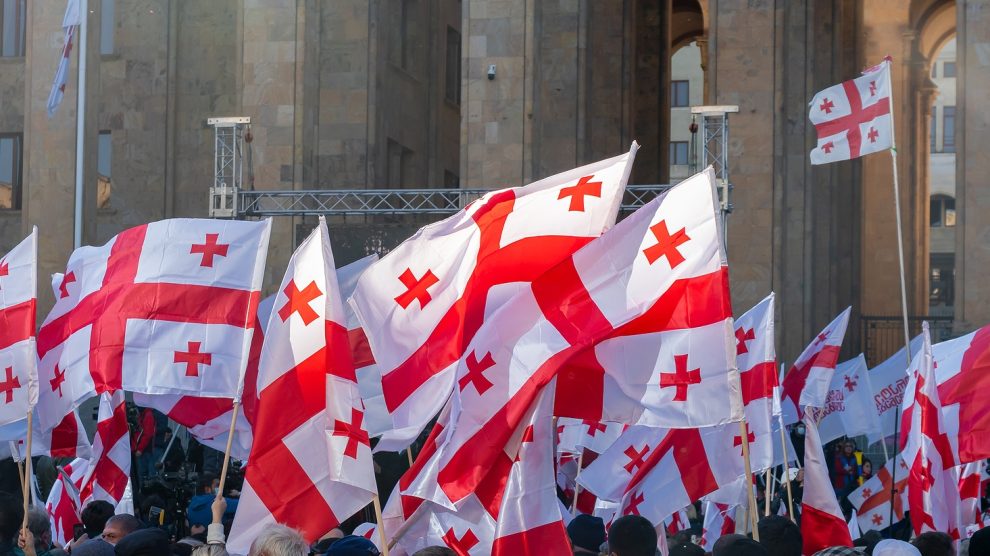In semi-democratic/hybrid systems such as Georgia, where emotions, national pride, and cultural symbols are identity markers for society, enrolling sports stars to support the ruling party can be effective.
For the Georgian Dream party, which has run Georgia since 2012, the run up to a crucial parliamentary election later this month has been somewhat chaotic.
The government’s adoption of the so-called ‘foreign agents’ law—which severely impacts the work of NGOs—was a huge step backwards, leading to widespread protests back in May. The policy is strongly opposed by Georgian voters and the country’s international partners.
- Football, protests, and the emergence of New Georgia
- Economy in focus: Georgia
- ‘It’s never been easier to pick a side’
Indeed, the policies of the Georgian Dream party increasingly resemble authoritarianism with its power-hungry system, where the party’s representatives try to maintain a positive image while their statements and outright disinformation campaigns have the opposite effect.
One of the methods Georgian Dream has deployed to maintain its popularity and attract voters involves enlisting various successful/popular Georgian figures, including them on its pre-election party lists to support certain laws and policies.
Appointing non-political figures such as athletes and Olympic champions to political positions was a well-used tactic in the Soviet Union and remains so in contemporary Russia. It is a common populist strategy that aims to leverage the popularity and public trust these individuals have gained.
There were many instances in the Soviet Union and there are many in modern Russia. For example, Irina Rodnina, a three-time Olympic gold medalist immensely supported Vladimir Putin became a member of the State Duma in 2007. Another example is Alexander Karelin, who also pursued a career in politics, much like other Soviet and Russian athletes. His popularity in the Soviet Union and Russia and close ties to Putin were used strategically to get him elected to the State Duma for the first time in 1999.
Mirroring the Russian pattern
The Georgian political landscape closely resembles that of its northern neighbour. Georgian Dream did not waste much time in following Russia when Kakha Kaladze, a well-known Georgian football player, was appointed as the Minister of Energy not long after the 2012 parliamentary election. Since 2017, he has served as the mayor of Tbilisi. His reputation and popularity in football contributed significantly to his political transition.
Similarly, Levan Kobiashvili, another former football player, was elected as a member of the Georgian Parliament in 2016, reflecting a trend of athletes entering politics.
The Georgian Dream party has been following a consistent strategy, using politically unpopular but well-known faces as key leverage while in power. A relatively large wave of sportspeople has moved into politics ahead of the elections. In light of the Georgian Dream party’s declining popularity, strained relationships with and distancing from international partners in recent years, the party has included successful Olympic athletes on its electoral party list for the October 26 elections.
According to a recent study conducted by Edison Research, the chances of Georgian Dream winning another majority look slim. The poll suggests that Georgian Dream would take only 32 per cent of the vote, far less than the combined support for opposition parties (52 per cent).
In response to this, the government has sought to associate more Olympic athletes, once extremely dear to the Georgian people, such as Lasha Talakhadze, a Georgian weightlifter, and Geno Petriashvili, a wrestler, with its party banner.
They quickly started promoting the party message to the public. The central election slogan of Georgian Dream conveys the idea only the party has prevented Georgia becoming a second front in the Russia-Ukraine war. With the populist slogan, ‘No to war, choose peace!’, the athletes on the party list are following the government’s rhetoric and declaring their support for a party that claims to have maintained peace and which aims to bring Georgia into Europe with dignity.
A pivotal moment: Georgia’s electoral decision
The identity of these people in Georgian society is linked with representing the name of Georgia on the international arena and achieving remarkable success for the country.
Now, their addition to the party list has become a strategic move by Georgian Dream. The purpose of enrolling them is directly related to its need to attract a broader base of voters. These figures have strong nationalistic appeal in society.
Georgian Dream is therefore attempting to gain/regain its popularity among a segment of society that is either nihilistic or merely uninterested in traditional political elites.
In semi-democratic/hybrid systems such as Georgia, where emotions, national pride, and cultural symbols are some sort of identity markers for society, these tactics can be quite effective.
Georgian society faces an important choice on October 26. The ruling party has become the object of significant international criticism for its anti-Western actions. The latter is a bitter pill for the Georgian people to swallow given that, according to a 2023 poll, 89 per cent of the population supports Western alliances and Georgia’s accession to these.
Therefore, the October parliamentary elections should serve as a strong message to the Georgian Dream party that leading the country in the wrong direction will not be tolerated—and that recruiting sports stars to its cause will do nothing to change that.
Unlike many news and information platforms, Emerging Europe is free to read, and always will be. There is no paywall here. We are independent, not affiliated with nor representing any political party or business organisation. We want the very best for emerging Europe, nothing more, nothing less. Your support will help us continue to spread the word about this amazing region.
You can contribute here. Thank you.


